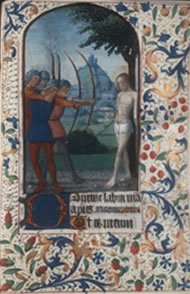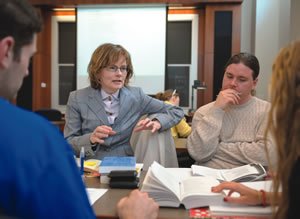SU's Ray Smith Symposium explores history of Queer sexuality
Yearlong symposium features mini-residencies by eight visiting scholars

For more information about the keynote events, contact Cassidy Perrault in The College’s Office of Curriculum, Instruction and Programs at 315-443-1414. For more information about the HC Mini-Seminars, contact Karen Ortega in The SU Humanities Center at 315-443-7192.
The symposium is organized and presented by the Renaissance and Medieval Studies Working Group, composed of interdisciplinary scholars from across campus. Dympna Callaghan, The College’s newly appointed William Safire Professor of Modern Letters, has taken a leadership role in the planning.
“‘Sex and Power’ focuses on Queer work from art history, literature, history and musicology, with the idea that the sometimes less restrictive understandings of sexual identity found in the past have an immediate relevance to current issues,” she says, citing as examples the Tyler Clementi case and recent repeal of “Don’t Ask, Don’t Tell.” “While the European past has seen periods of brutal repression, our own time is not necessarily the most liberal, with regard to same-sex practices and identities.”
To illustrate her point, Callaghan and her colleagues have invited a distinguished array of scholars to campus. Each expert will serve a two-day residency, including a Thursday keynote address at 7 p.m. in the Killian Room, Room 500 of the Hall of Languages, followed by a Friday HC Mini-Seminar from 9:30-11:30 a.m. (with breakfast served at 9 a.m.) in The SU Humanities Center Seminar Room, Room 304 of the Tolley Humanities Building.
The only exception is Wendy Heller’s keynote address, which takes place in the Heroy Geology Laboratory.
The visiting scholars and their lecture titles are as follows:
Valerie Traub, the Frederick G. L. Huetwell Professor of English and Women’s Studies and chair of women’s studies at the University of Michigan: “Shakespeare’s Sex” (Sept. 8-9);
Michael Rocke, the Nicky Mariano Librarian and director of the Biblioteca Berenson at Villa I Tatti, the Harvard University Center for Italian Renaissance Studies in Florence, Italy: “Sodo and His Friends: ‘L’amore masculino’ and Male Friendship in Early Modern Italy” (Oct. 20-21);
James M. Saslow, professor of Renaissance art and theater at the CUNY Graduate Center: “Gianantonio Bazzi the Sodomite: A ‘Gay Gaze’ in Italian Art” (Nov. 10-11);
Wendy Heller, professor of music and director of the Program in Italian Studies at Princeton University: “Maenads, Mayhem and the Mystique of the Feminine in Italian Baroque Opera” (Dec. 1-2);
John Kitchen, associate professor of history and classics at the University of Alberta: “Saints and Their Secrets” (Jan. 19-20);
Thomas King, associate professor and associate director of graduate studies of English at Brandeis University: “‘Oh’: Modern Subjectivity’s Recursive Figuration of Itself as the Flesh of the Voice” (Feb. 23-24);
Diane Wolfthal, the David and Caroline Minter Chair in the Humanities and professor of art history at Rice University: “Images of Sexual Crime and Punishment in Medieval and Early Modern Europe” (March 29-30); and
Linda Phyllis Austern, associate professor of musicology at Northwestern University: “‘Lo, Here I Burn’: Musical Figurations and Fantasies of Male Desire in Early Modern England” (April 12-13).

Callaghan says the speakers will specifically look at how power shapes, distorts, produces and represses sexual identities. Along with sexual subcultures, which have been historically marginalized, the speakers will also examine the systematic erasure of the history of sexual identity.
“We are calling into question modern conceptions of gender that have been influenced by past sexual roles and practices,” adds Callaghan, an expert in early modern English literature. “Our goal is to create a dialogue between the past and present—one involving students, scholars and activists from our campus community.”
This winter, “Sex and Power” partners with Syracuse University Library for an exhibition titled “The Power and the Piety: The World of Medieval and Renaissance Europe.” The exhibition showcases a variety of rare books and manuscripts, including illuminated prayer books decorated in gold leaf, a page from the Gutenberg Bible, and an Antiphonal Elephant Folio, from the Special Collections Research Center. For more information, contact Sean Quimby, librarian and director of the SCRC, at 315-443-9759.
“Sex and Power” is enabled by a bequest from the estate of Ray W. Smith ’21. Additional support for this year’s programming comes from the Office of the Chancellor; the departments of Art and Music Histories; English; History; Languages, Literatures and Linguistics; Women’s and Gender Studies; the LGBT Studies Program; and The SU Humanities Center, which sponsors the HC Mini-Seminars.
The Ray Smith Symposium is named for the Auburn, N.Y. native who, after graduating from SU in 1921, was a highly respected teacher and administrator.
Media Contact
Rob Enslin
